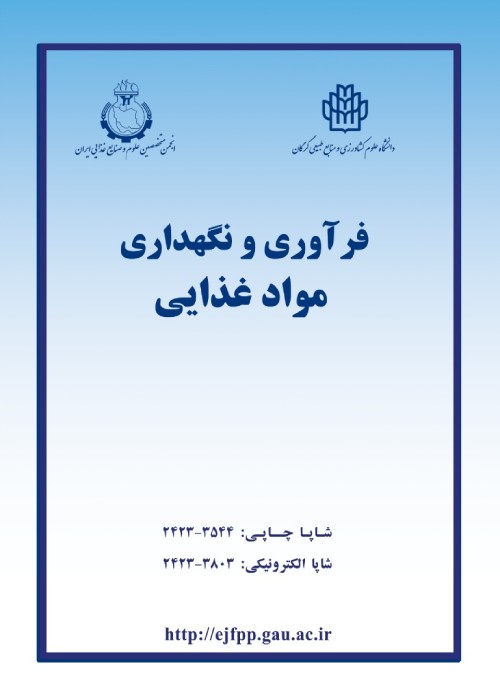Optimization of Ultrasound-assisted extraction of Quince seed mucilage using Response Surface Methodology
Author(s):
Article Type:
Research/Original Article (دارای رتبه معتبر)
Abstract:
Background And Objectives
Nowadays, different methods of hydrocolloid extraction has been studied and the effect of these methods has been investigated on functional properties of these hydrocolloids. According to these studies, it has been found that different variables has influence on hydrocolloids properties such as temperature, water to seed ratio, pH, salt concentration and extraction time. Quince tree is local tree in Asia and widely grow in north of Iran. The fruit of this tree has seeds which have extractable mucilage on its outer surface. Extraction of Quince seeds mucilage always was done by conventional methods and there is limited information about using new technology such as ultrasound on extraction. The objective of present study is to assess the effect of extraction by ultra sound wave in addition to some variables such as temperature and pH on extraction yield and rheological properties of extracted mucilage. In order to obtain optimum extraction yield and apparent viscosity, optimization of Quince seed mucilage extraction was done using Response Surface Methodology and Central Composite Rotational Design and Optimum operating condition of extraction was predicted.Materials And Methods
Quince seeds were obtained from Gilan ecotype. In order to determine the effect of different parameters on yield (%) and apparent viscosity (mPa.s) of extracted mucilage, three independent variables including temperature (2555ºC), ultra-sonication time (310 min), and pH (68) were investigated. Response Surface Method was used to design Experiments. Apparent viscosity of mucilage were measured by rotational viscometer Brookfield at 50 RPM in constant temperature 25ºC. Using regression analysis, a second-order polynomial model was developed for each response. Chemical composition of extracted mucilage was determined using AOAC standard methods.Results
among investigated variables, temperature and ultra-sonication time had significant effect on extraction yield and viscosity while pH was not significant (pConclusion
Quince seed mucilage showed a non-Newtonian and shear thinning (pseudoplastic) behavior. Extraction yield and apparent viscosity has affected by some extraction parameters such as temperature and ultra-sonication time so optimum yield and viscosity can access with determining suitable conditions of mucilage extraction.Keywords:
Language:
Persian
Published:
Electronic Journal of Food Processing and Preservation, Volume:9 Issue: 2, 2018
Pages:
17 to 31
magiran.com/p1812318
دانلود و مطالعه متن این مقاله با یکی از روشهای زیر امکان پذیر است:
اشتراک شخصی
با عضویت و پرداخت آنلاین حق اشتراک یکساله به مبلغ 1,390,000ريال میتوانید 70 عنوان مطلب دانلود کنید!
اشتراک سازمانی
به کتابخانه دانشگاه یا محل کار خود پیشنهاد کنید تا اشتراک سازمانی این پایگاه را برای دسترسی نامحدود همه کاربران به متن مطالب تهیه نمایند!
توجه!
- حق عضویت دریافتی صرف حمایت از نشریات عضو و نگهداری، تکمیل و توسعه مگیران میشود.
- پرداخت حق اشتراک و دانلود مقالات اجازه بازنشر آن در سایر رسانههای چاپی و دیجیتال را به کاربر نمیدهد.
In order to view content subscription is required
Personal subscription
Subscribe magiran.com for 70 € euros via PayPal and download 70 articles during a year.
Organization subscription
Please contact us to subscribe your university or library for unlimited access!



